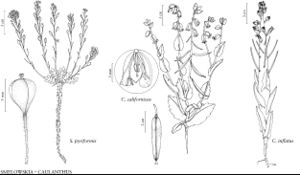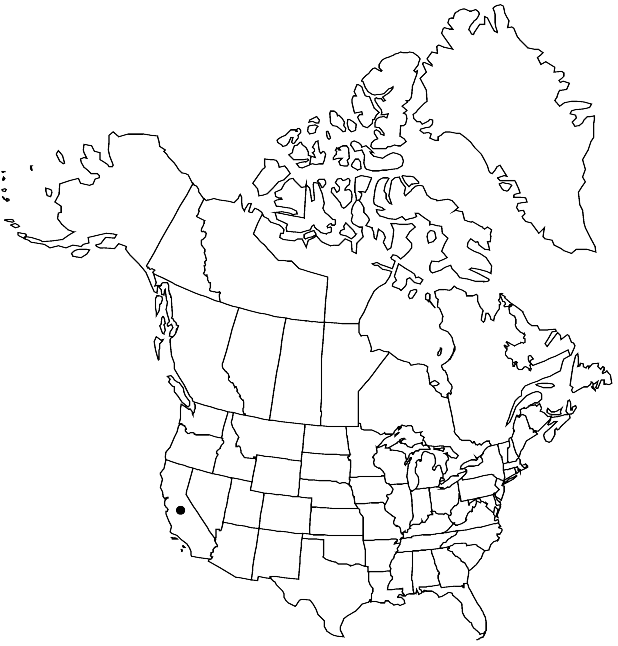Difference between revisions of "Caulanthus inflatus"
Proc. Amer. Acad. Arts 17: 364. 1882.
FNA>Volume Importer |
imported>Volume Importer |
||
| (5 intermediate revisions by 2 users not shown) | |||
| Line 6: | Line 6: | ||
|place=17: 364. 1882 | |place=17: 364. 1882 | ||
|year=1882 | |year=1882 | ||
| + | }} | ||
| + | |special_status={{Treatment/ID/Special_status | ||
| + | |code=F | ||
| + | |label=Illustrated | ||
| + | }}{{Treatment/ID/Special_status | ||
| + | |code=E | ||
| + | |label=Endemic | ||
}} | }} | ||
|basionyms= | |basionyms= | ||
| Line 11: | Line 18: | ||
|name=Streptanthus inflatus | |name=Streptanthus inflatus | ||
|authority=(S. Watson) Greene | |authority=(S. Watson) Greene | ||
| + | |rank=species | ||
}} | }} | ||
|hierarchy=Brassicaceae;Brassicaceae tribe Thelypodieae;Caulanthus;Caulanthus inflatus | |hierarchy=Brassicaceae;Brassicaceae tribe Thelypodieae;Caulanthus;Caulanthus inflatus | ||
| Line 35: | Line 43: | ||
-->{{#Taxon: | -->{{#Taxon: | ||
name=Caulanthus inflatus | name=Caulanthus inflatus | ||
| − | |||
|authority=S. Watson | |authority=S. Watson | ||
|rank=species | |rank=species | ||
| Line 49: | Line 56: | ||
|publication title=Proc. Amer. Acad. Arts | |publication title=Proc. Amer. Acad. Arts | ||
|publication year=1882 | |publication year=1882 | ||
| − | |special status= | + | |special status=Illustrated;Endemic |
| − | |source xml=https:// | + | |source xml=https://bitbucket.org/aafc-mbb/fna-data-curation/src/2e0870ddd59836b60bcf96646a41e87ea5a5943a/coarse_grained_fna_xml/V7/V7_1173.xml |
|tribe=Brassicaceae tribe Thelypodieae | |tribe=Brassicaceae tribe Thelypodieae | ||
|genus=Caulanthus | |genus=Caulanthus | ||
Latest revision as of 22:30, 5 November 2020
Annuals; glabrous or sparsely (or densely) pilose basally. Stems erect, unbranched or branched distally, (hollow, strongly inflated, fusiform, to 4 cm diam. at widest point), 1.5–9.7 dm. Basal leaves rosulate; petiole 0.5–5 cm; blade obovate to oblanceolate, 1–13 cm × 5–60 mm, margins entire or dentate-sinuate. Cauline leaves (distalmost) sessile; blade ovate to lanceolate, 1–20 cm × 5–70 mm (base amplexicaul), margins entire. Racemes (densely flowered), without a terminal cluster of sterile flowers. Fruiting pedicels ascending to divaricate, 3–12 mm, sparsely to densely pilose, or glabrous. Flowers: sepals erect, (dark purple at least apically, whitish basally), narrowly ovate to lanceolate or oblong-lanceolate, 5.5–14 × 2–3 mm (unequal, adaxial one slightly smaller or narrower, keeled); petals purple, 9–14 mm, blade 3–4 × 1.5–2 mm, crisped, claw oblanceolate to oblong, 6–10 × 1.5–3 mm; filaments in 3 unequal pairs, (median pairs connate), abaxial pair 4–8 mm, lateral pair 3–5 mm, adaxial pair 7–10 mm; anthers narrowly oblong, equal, 2–4 mm. Fruits erect to ascending, terete, 3.5–12.7 cm × 2–3 mm; valves each with prominent midvein; ovules 58–82 per ovary; style obsolete or, rarely, to 0.4 mm; stigma strongly 2-lobed (lobes opposite valves). Seeds 1.5–3 × 0.7–1.7 mm. 2n = 28.
Phenology: Flowering Feb–Jun.
Habitat: Desert plains, dry hillsides
Elevation: 150-1500 m
Discussion
Caulanthus inflatus is found in central and southern California.
Selected References
None.

